ABeam Consulting aims to address social issues through the provision of consulting services. This commitment is articulated in our vision, referred to as our “Value Creation Story.” To achieve this vision, we prioritize areas of focus based on opportunities and risks, identifying them as material issues.
For us, as a consulting firm, addressing social issues necessitates co-creation with a variety of stakeholders. By disclosing our material issues both internally and externally, we enhance our transparency and trustworthiness as a firm, while also strengthening our coordination with stakeholders and enabling more effective actions.
Core initiative areas
1. Approach to Focus Areas (Material Issues)
2. Our Process for Identifying and Revising Material Issues
At ABeam Consulting, we put a strong focus on identifying and revising material issues that align with our business strategy. We identify our material issues through the following steps. These issues are continuously reviewed in response to societal demands and changes in the business environment, while also being integrated into our internal and external operations.
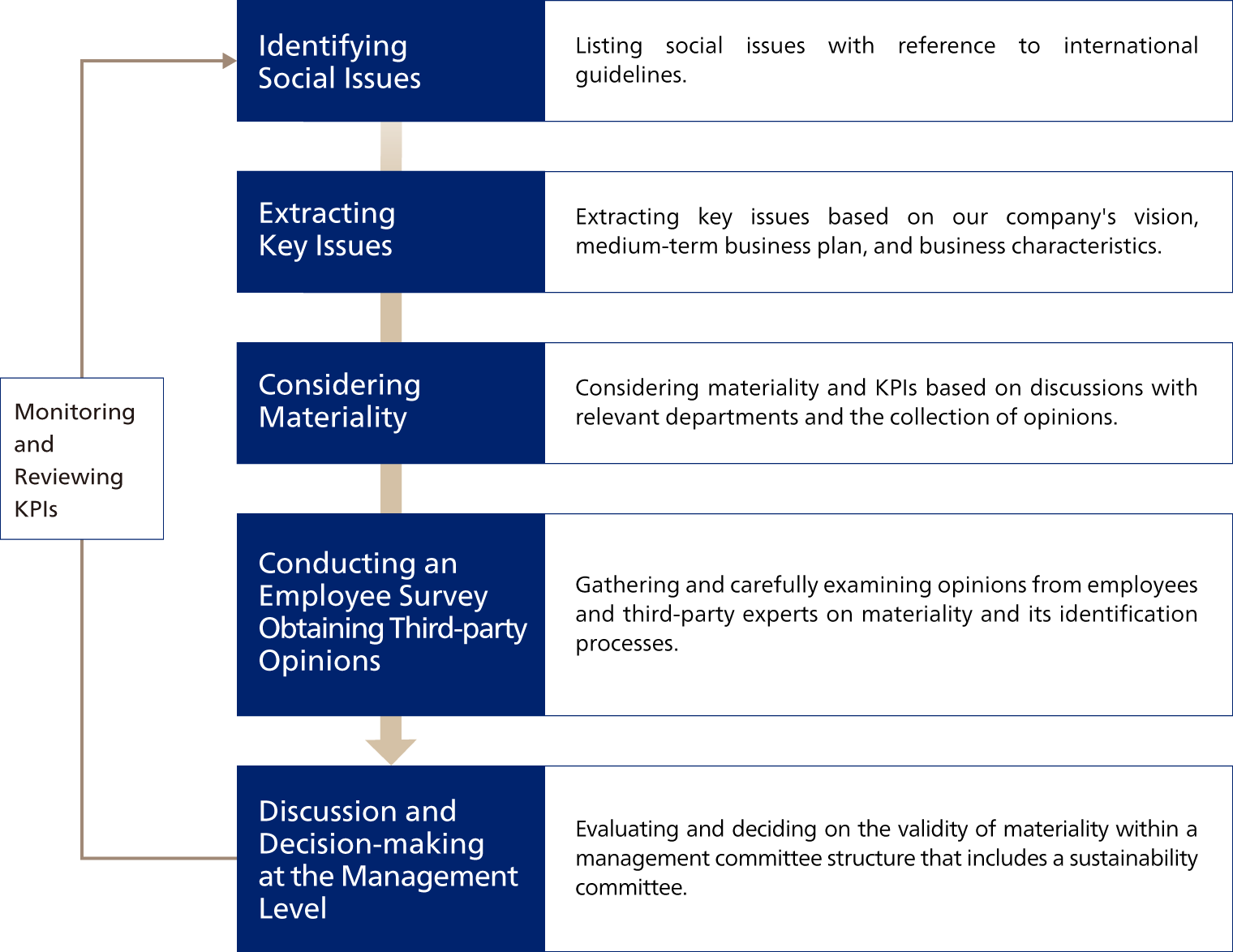
Trajectory of Revision
In 2020, we identified material issues based on the approach to the SDGs. Following subsequent changes in the business environment and the formulation of our new medium-term management plan, we revised our material issues in March 2025.
3. Material Issues
In our medium-term management plan, we established "Value Creation Management" as the management system for achieving our Value Creation Story.
The starting point for this lies in human capital management. By advancing an HR strategy aligned with our corporate and business strategies, we maximize the talent of our people over the medium to long term. Leveraging this talent, we aim to generate economic and social values (CSV) through our client services, while also seeking to generate social value (CSR) through our own corporate activities.
Based on the belief that these activities contribute to social sustainability and connect to our own sustainable growth, we have organized our material issues across the three components that constitute value creation management.
We will also consider specific measures in relevant departments, set KPIs, and regularly monitor their progress through our sustainability committee for each initiative theme.
The overall picture of value creation management
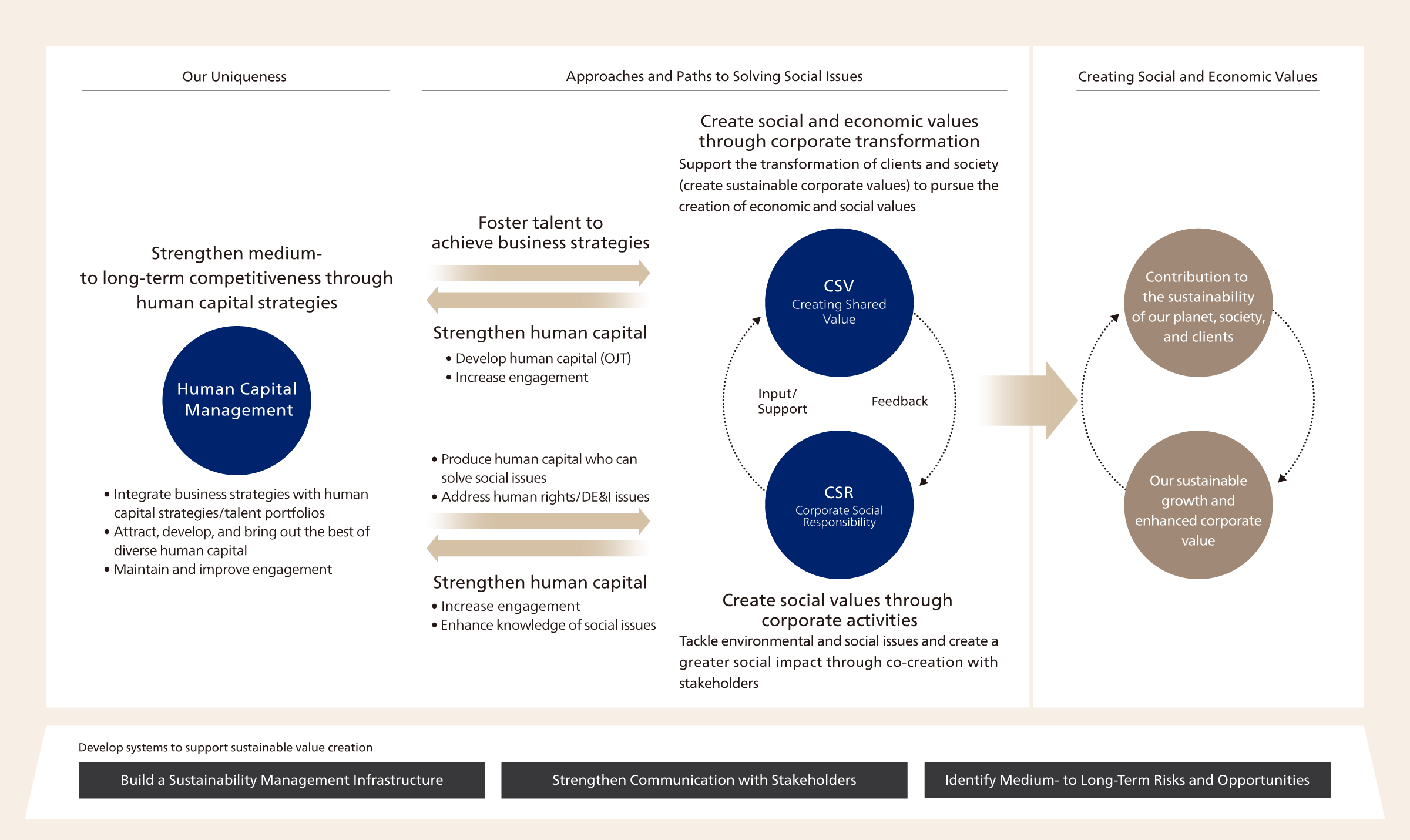
Human Capital Management
We view the alignment of business strategy and HR strategy as the key factor in realizing human capital management. To bring about success in business strategy, we organize key focus initiative themes related to HR and identify them as HR material issues.
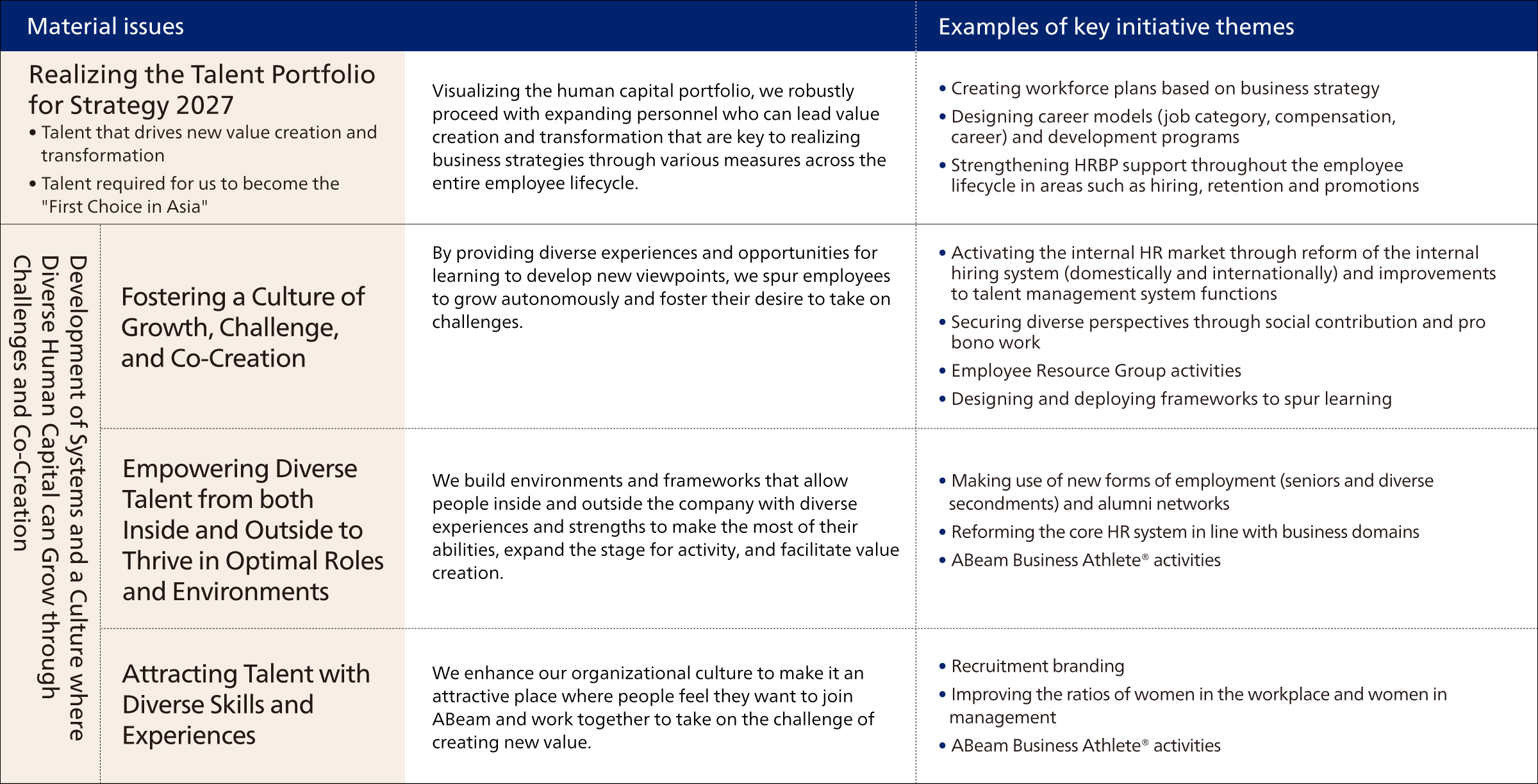
CSV(Creating Shared Value)
We see our role as not only addressing challenges but also co-creating and realizing the future of society and industry together with our clients.
We also view developing people who can actively and sustainably drive change and fostering a culture that promotes that change through our client services as an important mission.
Based on the approach outlined above, we have identified two material issues. Both are achieved by working together with our business partners, as we seek to solve problems while expanding the scope of co-creation.

CSR(Corporate Social Responsibility)
As we are an unlisted company, we believe that we need to independently and faithfully confront our corporate social responsibility. Taking into account the nature of our business, we identified material issues while also referencing international guidelines.
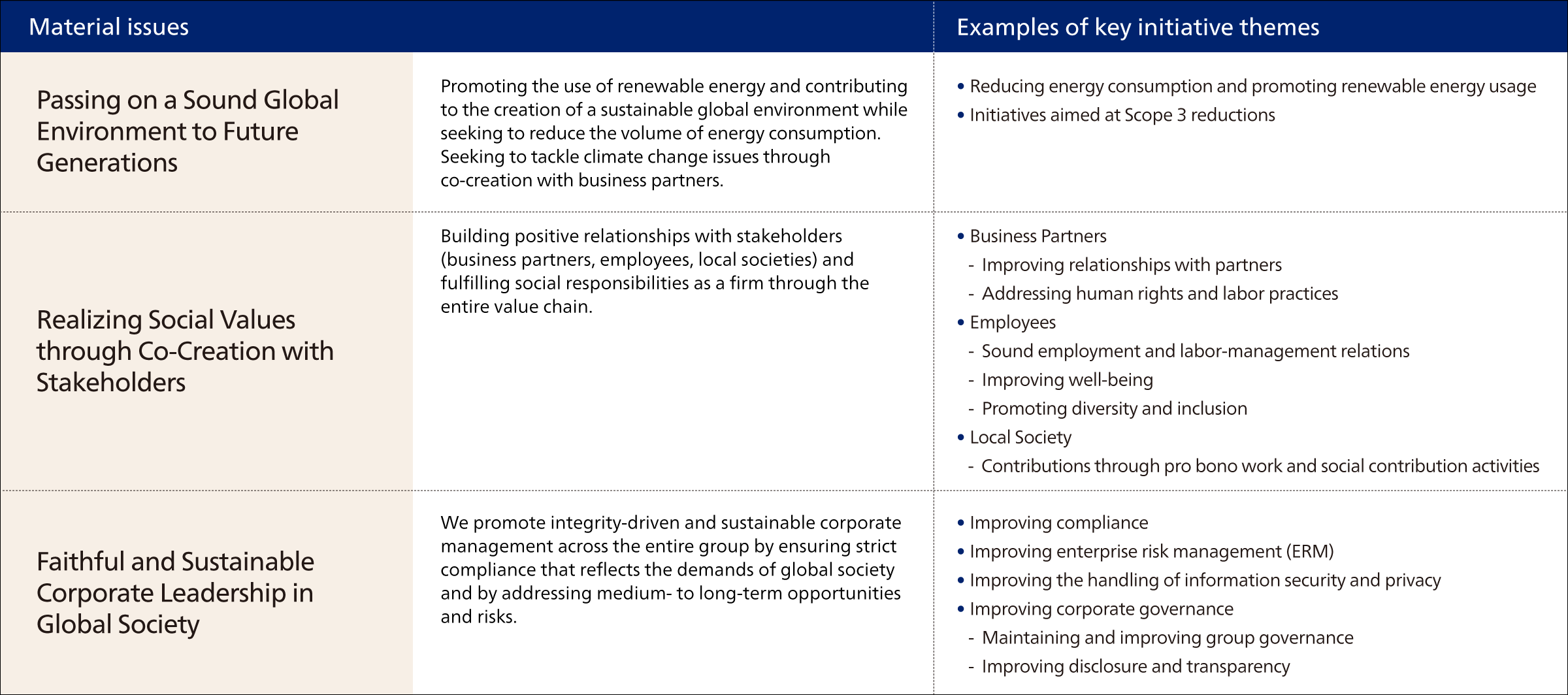
4. Opinions from External Stakeholders (Experts)
Mr. Toshihiko Goto
Global Compact Network Japan (GCNJ)
Board Member
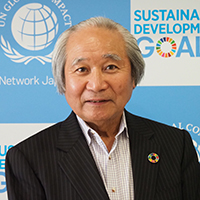
The scope of materiality identification encompasses the entire business model and value chain. In consulting, the diversity of clients means that all sustainability issues could potentially become material. Below, I will primarily discuss the material issues from the company's perspective. However, in practice, it is crucial to pay close attention to and focus on the material issues of individual clients. In your case, it is evident that the entire scope is addressed, as indicated by terms like 'Real Partner' and value chain transformation.
ABeam has fundamentally revised its material issues through an appropriate process. These three broad categories (human capital management, CSV, and CSR) are highly abstract and will likely form long-term pillars of vision and strategy for the company as the foundations for value creation management, without changing going forward. At the same time, the KPIs are inherently dynamic, so it is appropriate that ABeam has incorporated regular revisions into its operating process.
The three broad categories are not independent but interrelated, as illustrated. Each KPI may also relate to other categories, making interactivity essential in strategy formulation.
Human capital is the most significant resource in consulting, and the short- and long-term strategies set are highly appropriate. We have entered an era of post-industrial capitalism, where human resources have become the most crucial management asset across all industries. Japan and the West have long since faced declining birth rates, and countries like China, South Korea, and Thailand are experiencing the same. Securing the necessary talent will require changes suited to a period of demographic onus, such as revising work practices from the demographic bonus period and implementing DEI initiatives. A thorough work-life balance for all employees will be essential. In the case of ABeam, these measures are included within 'CSR' as KPIs, and I expect that the details will be expanded to form the basis of the company's human capital.
The concept of 'CSV' as a bundle is a brilliant and innovative idea. However, CSV is a term that can be interpreted differently by various readers. Therefore, it is necessary for ABeam to explain its interpretation of CSV in both internal and external communications.
CSR KPIs cover a wide range of areas, but they have been regularly revised and systematized, making them appropriate. Among these, climate change is a global challenge that all entities should address. However, the burden for your company alone is not significant. Therefore, another possible strategy would be to position this as a challenge for contributing to value creation in society as a KPI under CSV.
Finally, there is a global trend towards mandatory disclosure, with Europe leading the way as a standard setter. However, initiatives should take precedence over disclosures, so understanding the background and true intentions behind these trends, particularly in Europe, is crucial. The importance and clarification of monitoring processes for the outcomes of any initiative cannot be overstated. Information disclosure, both internally and externally, should be based on policies and strategies with clear objectives.
Takehiko Mizukami
SharedValue Consulting LLC
CEO

Materiality involves identifying the issues where a company can make the most significant contributions towards achieving a sustainable world. Specifically, it entails pinpointing the major negative impacts of the company's business and value chain and mitigating them, while also identifying the issues where the company can leverage its strengths to create substantial positive impacts. Additionally, it involves strategically addressing the issues that significantly affect the company's value due to changes in policies, customer behaviors, or the intensification of the issues, which can present risks and opportunities.
In the case of a consulting firm, negative impacts may include human rights violations due to pressure to enhance client value, or energy consumption from travel and server usage. However, compared to sectors like manufacturing, the scale and scope of these impacts are relatively limited. While it is important for companies to understand and mitigate the negative impacts of their business and value chains with appropriate resolution, the focus should be on creating positive impacts. ABeam’s material issues include CSR challenges to address negative impacts, CSV challenges to generate positive impacts, and human capital issues, recognizing the importance of people to the firm. This unique framework highlights ABeam’s distinctive characteristics.
CSV, which holds particularly high expectations, includes “Creating the Future of Society and Industry” and “Fostering Talent to Drive Transformation in Society.” While the specifics of how to create the future of society and industry to achieve a sustainable world are not detailed, it is possible to provide insights for creating sustainable value across all consulting domains by understanding the positive and negative impacts of clients. I hope that ABeam consultants, with this awareness, will contribute to creating a future aimed at achieving a sustainable world.
“Fostering Talent to Drive Transformation in Society” refers to cultivating individuals who can create sustainable corporate value through the growth and transformation of awareness at business partner firms, ultimately leading to industry-wide transformation. To put this into practice, ABeam personnel must first possess literacy and ambition related to sustainability.
While your firm does not explicitly state in its human capital management materiality that it aims to enhance sustainability literacy and ambition to realize a sustainable world, I strongly encourage your firm to pursue this. Increasing such personnel will inevitably enable greater contributions to the realization of a sustainable world through your CSV initiatives.
